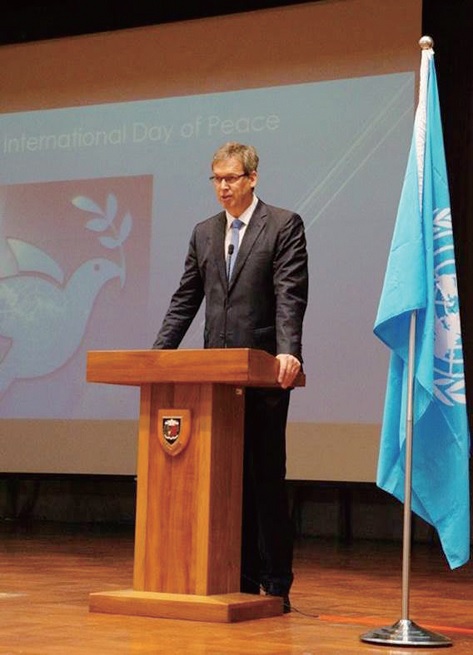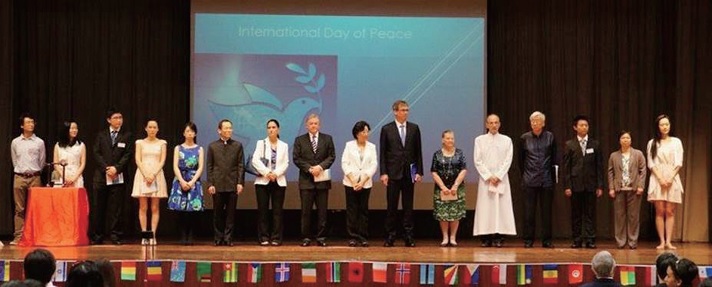歐盟港澳辦事處主任彭家傑在聯合國和平日典禮致辭
歐盟港澳辦事處主任彭家傑在聯合國和平日典禮致辭
Speech by Vincent Piket at the UN International Day of Peace Ceremony
The Hong Kong Peace Festival 2014
La Salle College, Hong Kong, 20 September 2014
I am delighted to represent the European Union at the celebration of the 2014 United Nations International Day of Peace in Hong Kong. The International Day of Peace is celebrated globally. It unites the citizens of the world in expressing their wish for peace and their desire for a global society in which human beings can live without fear of conflict.
As EU representative, I am very grateful for being part of the International Peace Day in Hong Kong, because the European Union is a peace project. It is probably one of the most radical peace-building projects ever realised in human history. Peace has always been and will always be the fundamental purpose of the European Union.
The result is now that, in the European Union, three generations have only experienced peace since they were born. Europeans can travel across borders without having to show their passports at national borders; foreign visitors enjoy the same ease of travel. We pay with the same currency in most of our Member States. We elect our representatives to the one European Parliament. And together, we lift common burdens that no single state can carry individually.

Vincent Piket, Head of the EU Office to Hong Kong and Macao
For the 508 million EU citizens, war between their nations has become almost inconceivable. For advancing the causes of peace, reconciliation, democracy and human rights in Europe, the EU received the Nobel peace prize in 2012.
Yet, if we take pride in what Europe has achieved, we do so from a very humble position. Because the EU was not always the region of peace it is now. It was born out of the ashes of two devastating world wars. In 2014, we mark the century of the breakout of the First Great War. We called it ”The War to End all Wars”. Yet, little more than twenty years, in 1939, we descended into another World War, a war that saw the most cruel of genocides.
But after the Second World War, we saw a change. Truly visionary political leaders came together on the common realisation that there must be no more wars on the European continent. They realised that only by bringing former enemies together around common interests, by finding common solutions to shared problems, war between countries would become an impossibility. It would allow economies to flourish, and give the citizens the space and opportunity to develop their potential as human beings.
Since that time in the early 1950s, the European Union has grown tremendously. We started with six member states; others followed successively. Notably, Greece, Spain and Portugal joined after their respective authoritarian regimes had fallen. In 1989, the Berlin Wall and the Iron Curtain came down; West and East Germany were peacefully reunited, the EU lent major political and financial support to this. And more than 120 million people in the former communist countries in Central Europe were liberated from dictatorships and could rejoin the EU mainstream. This was the end of the Cold War. Last year, Croatia became the 28th member state of the Union. It was part of an EU strategy to seal peace after the 1990s war in the Western Balkans.
Each time when a new country joined the EU, the EU brought a perspective of stability, it helped consolidate nation-to-nation relations into a larger, supporting framework, and it gave a perspective of peace.
Was that easy? No, it was hard work! Hard work which took many difficult, painstaking negotiations. But, as Jean Monnet, one of the Union's founding fathers, described the philosophy by saying,”it is better to fight around the negotiating table than on the battlefield”. It also required willingness to compromise, give and take. It involved the need for understanding and tolerance for the other person's point of view and for their worries about problems back home.
And it required giving up the customary ways in which we think about our country, our nation state, as well as our ideas about sovereignty. In fact it meant accepting the fact that, if you want to create a common destiny, you have to share part of your sovereignty with your partners.
"Good fences make good neighbours," wrote the American poet Robert Frost. That may have been applicable in the countryside of New England, where Robert Frost was from. And that was the guiding principle of Europe’s nation-states in the 19th century.
But evidently, that principle had utterly failed. For 20th century Europe after the Second World War, on the other hand, the path has been one of taking fences down. Rather than just be neighbours on a shared continent, the EU countries decided to live to together. We moved in with one another.
Is the job of building the European house done, is it finished? No, that job goes on, the European house is not finished, it never will be! It needs constant maintenance and care. Within our continent we have to continue to nurture and protect peace and stability against the forces that work against it. Against religious intolerance, against ethnic or racial prejudice, and against discrimination in the many forms this can take. Against the risks posed by massive flows of refugees from war-torn countries in the Middle East and Northern-Africa. And against the threats from countries who still propagate military force as a solution to disputes.

Building Europe also involves economic policy. After all, economic decline, unemployment and poverty can be a breeding ground for social problems in individual countries. Equally they can cause chronic imbalances between our member states, and pose risks to the Union as a whole. Hence, peculiar though it may sound, promoting economic growth and economic convergence in the EU is part of the building blocks for peace in Europe.
The Euro, our common currency, is part of that. The reason why it has come out of the financial crisis so strongly is precisely because the Eurozone members are committed to the Euro as part of our peace compact. The Euro’s value is much more than the counter-value you get for it in HK Dollars or RMB. The economists who predicted the Euro's collapse overlooked that political value, that “peace dividend” entirely.
But for maintaining peace we cannot be inward–looking. The EU is open to the world, we are affected by it, and we need to reach out to countries and regions outside the EU, even outside Europe. Because global developments, global security threats affect us all and because citizens everywhere should be given the chance of a peaceful, decent and fulfilling life.
And the fundamental premise of our approach is that it is impossible to solve disputes through military force. Instead, for us disputes can only be solved through dialogue, through engagement, and through cooperation.
It makes that in foreign policy the EU sometimes looks a bit like a do-gooder. We do not have the sort of military assets that would make us a super power. Rather, what we bring to the table is soft power. Some say that that is not a great deal. But in fact many of our foreign partners appreciate it, for its non-confrontational character. It helped us mediate a peace agreement between Serbia and Kosovo. It was the reason why the EU was asked to be the negotiator for the Iran nuclear talks, on behalf of the permanent Security Council members.
Here in Asia, the EU co-sponsored the peace treaty agreed by the Philippines government and the Moro Islamic Liberation Front, putting an end to a struggle that began in the 1960's. In Indonesia, the EU helps implement the peace agreement between the Indonesian government and insurgents in Aceh, ending a struggle that has claimed 15,000 casualties. WE work very closely with ASEAN, which we see as a sister organisation promoting regional integration in similar ways to ours in Europe.
And let us not forget the big global challenges that threaten peace. One that is particularly acute is climate change. Last year, the UN calculated a faster than ever growth in CO2 emissions. We are about to reach the tipping point of the 2 degrees centigrade temperature increase that will fundamentally alter the climate on earth. It will cause extreme weather phenomena, disrupt food production and cause famine, flood massive swathes of land, displace billions of people and, it will plant the seeds of war, unless the world takes action, firmly and fast and in a spirit of solidarity and shared responsibility.
Governments and international organisations have a major role to play in all these matters. Yet there is only so much that can be done by governments, politicians, organisations and diplomats. The push for peace must come from below, from each and every one of us. Every generation is responsible for peace in its time and beyond, to forge friendships with other nations, to reject armed conflict as a means to solve differences, and to combat intolerance and discrimination wherever it is encountered.
Education plays an important role in this. Albert Einstein said "Peace cannot be kept by force. It can only be achieved by understanding". Teaching the differences in the cultures, customs, and religions of the world furthers tolerance and sympathy, while learning new languages promotes the mutual understanding and fraternity between nations.
Cultural exchanges and studying abroad on exchange semesters allow students to experience the differences in other countries first hand. In Europe, the Erasmus program promotes higher education exchanges, both within Europe and from other parts of the world. Three million young Europeans have benefitted from this, and it has changed their outlook on the world, on other countries and cultures, for good. It is impossible to prove this scientifically, but I am 100% certain that this is a major contribution to peace. In my opinion, the Asian countries could set up a similar, large-scale higher education exchange programme as a contribution to mutual understanding and stability across the Asian continent.
I will finish with the words of Robert Schuman, the French Foreign Minister who proposed the precursor of what later became the European Union. In 1950 he said: "World peace cannot be safeguarded without the making of creative efforts proportionate to the dangers which threaten it."
The Hong Kong International Day of Peace Ceremony and this afternoon’s Peace Ceremony are part of that endeavour of creative peace building around the world. It reminds us that, rather than a final destination, peace is a constant effort. No single woman or man can accomplish peace alone, we all share responsibility for keeping the peace in the world together.
I would like to congratulate the United Nations and the Peace International Foundation for co-organizing this International Day of Peace. I would also like to thank the Principal of La Salle College, Brother Steve Hogan, for hosting this wonderful ceremony.
Thank you very much.





